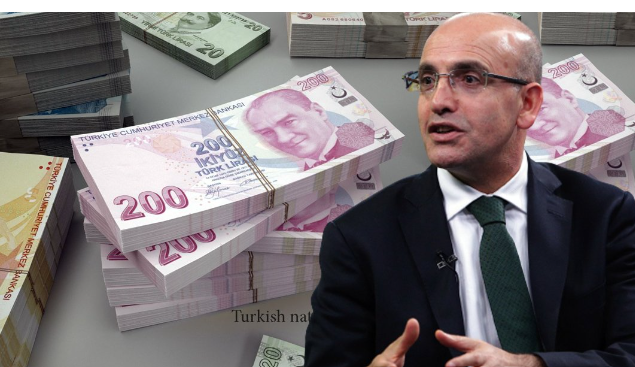Turkish Minister of Treasury and Finance Mehmet Simsek confirmed that the government is determined to achieve financial stability in the short term, after the central bank’s decision to raise the interest rate, which cause deep disappointment among economists and investors.
Simsek said, in statements in Ankara (Friday): “Our economic policies aim to ensure price stability and achieve financial stability in the short term, and we are determined to achieve these goals,” adding: “This is a stage that began with the central bank’s statement, Thursday. This stage will be managed firmly and gradually.
Simsek continued: “Our economic policy, which we will follow in the next stage, will revolve around 3 concepts, which are stability, trust and sustainability. Our main vision will be to ensure that our 85 million citizens, and our future generations, live more prosperously in peace and security, and to build an economic environment that allows individuals and society as a whole to reach happiness.”
He stressed that sustainable growth is an indispensable condition for prosperity and development, saying: “Sustainable growth will be achieved through investment and employment growth on the one hand, and productivity growth on the other hand. The most important determinant of investment and employment decisions is predictability.”
Simsek pointed out that the most important determinant of investment and employment decisions is the ability to predict, and that what provides the ability to predict is the achievement of confidence, explaining that the policy based on the principles of the market economy, the free exchange system and the open economy will provide a large flow of capital to Turkey.
He stated that “financing investments and production will ensure the restoration of stability and confidence in the Turkish lira… The stability of the lira and the return of confidence in it is the most effective solution in avoiding dollarization.”
On Thursday, the Turkish Central Bank raised the interest rate on one-week repurchase (repo), approved as a basic criterion for interest rates, by 650 basis points from 8.50 percent to 15 percent at once, for the first time in 27 months, with an emphasis on continuing to tighten policy.
The central bank said, in a statement after the Monetary Policy Committee meeting, that “monetary tightening will be gradually strengthened as necessary until a significant improvement in inflation expectations is achieved.”
The Turkish opposition criticized President Recep Tayyip Erdogan after the Central Bank’s decision to raise the interest rate, after insisting for nearly 3 years on an unconventional economic policy and not recognizing the rules of the real economy, and is based on reducing interest as the cause of inflation.
Ali Babacan, former deputy prime minister for economic affairs in Erdogan’s government and head of the opposition “Democracy and Progress” party, wrote that Erdogan should apologize to the Turkish people for his insistence on cutting interest rates in the past period and for his repeated promises during his campaign for the presidential elections to cut interest again. He believed that Erdogan had “twice deceived the people” and that he should apologize to him.
At the same time, the Turkish lira continued its decline for the second day in a row, following the central bank’s decision to hike interest rates, and it fell to an unprecedented record level in Friday’s trading.
The currency dropped as much as 3.2% against the dollar on Friday, before paring losses. It dropped 5.7% after a smaller-than-expected interest rate increase on Thursday and has depreciated 17% this month.
The lira is vulnerable as Turkish authorities face painful choices to restore economic credibility and reduce inflation. While the closely managed currency has been allowed to weaken more significantly since President Recep Tayyip Erdogan’s reelection last month, traders are still expecting more depreciation, derivatives show.
The lira traded 0.6% weaker at 25.0688 per dollar as of 5.18pm in Istanbul. The Turkish currency is headed for a 16th week of declines, its longest losing streak since 1999.
The central bank raised the one-week rate from 8.50% to 15% on Thursday, compared with median expectations for the rate to be moved up to 20%. The slower-than-expected tightening has led to a steep money-market curve, where the one-month deposit rate is at 27% and the three-month rate at 40%.
“The hawkish and committed press statement was not enough to convince investors and was outweighed by the under-delivery on interest rate hikes,” said Christian Wietoska, a strategist at Deutsche Bank AG. “This does not make it easier for the central bank, and risks of chasing the market – rather than taking the initiative over the upcoming months – have increased.”
Goldman Sachs Group Inc. economists Clemens Grafe and Basak Edizgil said the gradual change comments suggest that the central bank is likely to allow further depreciation to help rebalance the current account. “However, it will be difficult to fully float the lira without having an interest rate anchor,” they wrote in a research note.
While the lira remained on the back-foot, the gradual approach was liked by stock investors, with the shares of Istanbul-listed banks jumping by as much as 5.2% on Friday. Slow changes could help lenders cope with the low-yield government bonds they were forced to hold.
“The statements by the central bank and Mehmet Simsek signal that the policymakers don’t want a shock in financial markets and extra losses in bank balance sheets,” said Enver Erkan, chief economist at Dinamik Yatirim in Istanbul.
Various press sources
Follow our English language YouTube videos @ REAL TURKEY: https://www.youtube.com/channel/UCKpFJB4GFiNkhmpVZQ_d9Rg
And content at Twitter: @AtillaEng
Facebook: Real Turkey Channel: https://www.facebook.com/realturkeychannel/
